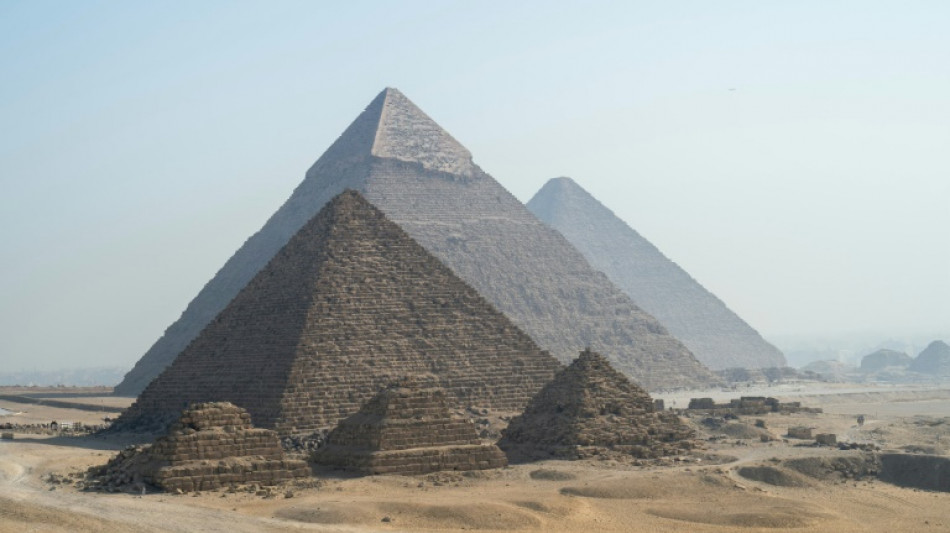
-
 Rome to charge visitors for access to Trevi Fountain
Rome to charge visitors for access to Trevi Fountain
-
Spurs 'not a quick fix' for under-fire Frank

-
 Poland president accuses Ukraine of not appreciating war support
Poland president accuses Ukraine of not appreciating war support
-
Stocks advance with focus on central banks, tech

-
 Amorim unfazed by 'Free Mainoo' T-shirt ahead of Villa clash
Amorim unfazed by 'Free Mainoo' T-shirt ahead of Villa clash
-
PSG penalty hero Safonov ended Intercontinental win with broken hand

-
 French court rejects Shein suspension
French court rejects Shein suspension
-
'It's so much fun,' says Vonn as she milks her comeback

-
 Moscow intent on pressing on in Ukraine: Putin
Moscow intent on pressing on in Ukraine: Putin
-
UN declares famine over in Gaza, says 'situation remains critical'

-
 Guardiola 'excited' by Man City future, not pondering exit
Guardiola 'excited' by Man City future, not pondering exit
-
Czechs name veteran coach Koubek for World Cup play-offs

-
 PSG penalty hero Safonov out until next year with broken hand
PSG penalty hero Safonov out until next year with broken hand
-
Putin says ball in court of Russia's opponents in Ukraine talks

-
 Czech Zabystran upsets Odermatt to claim Val Gardena super-G
Czech Zabystran upsets Odermatt to claim Val Gardena super-G
-
NGOs fear 'catastrophic impact' of new Israel registration rules

-
 US suspends green card lottery after MIT professor, Brown University killings
US suspends green card lottery after MIT professor, Brown University killings
-
Arsenal in the 'right place' as Arteta marks six years at club

-
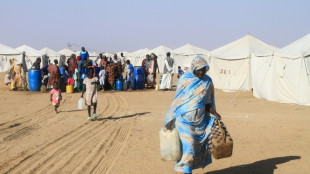 Sudan's El-Fasher under the RSF, destroyed and 'full of bodies'
Sudan's El-Fasher under the RSF, destroyed and 'full of bodies'
-
From farms to court, climate-hit communities take on big polluters

-
 Liverpool have 'moved on' from Salah furore, says upbeat Slot
Liverpool have 'moved on' from Salah furore, says upbeat Slot
-
Norway crown princess likely to undergo lung transplant

-
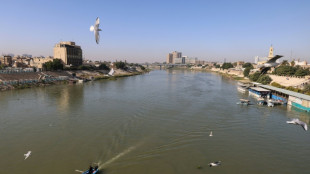 Iraq negotiates new coalition under US pressure
Iraq negotiates new coalition under US pressure
-
France's budget hits snag in setback for embattled PM

-
 Putin hails Ukraine gains, threatens more, in annual press conference
Putin hails Ukraine gains, threatens more, in annual press conference
-
US suspends green card lottery after Brown, MIT professor shootings

-
 Chelsea's Maresca says Man City link '100 percent' speculation
Chelsea's Maresca says Man City link '100 percent' speculation
-
Dominant Head moves into Bradman territory with fourth Adelaide ton

-
 Arsenal battle to stay top of Christmas charts
Arsenal battle to stay top of Christmas charts
-
Mexican low-cost airlines Volaris and Viva agree to merger
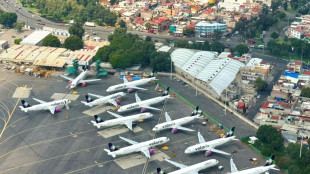
-
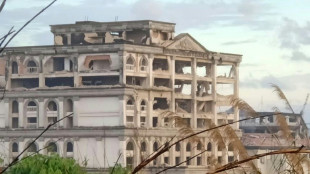 Border casinos caught in Thailand-Cambodia crossfire
Border casinos caught in Thailand-Cambodia crossfire
-
Australia's Head slams unbeaten 142 to crush England's Ashes hopes

-
 Epstein files due as US confronts long-delayed reckoning
Epstein files due as US confronts long-delayed reckoning
-
'Not our enemy': Rush to rearm sparks backlash in east Germany

-
 West Indies 110-0, trail by 465, after Conway's epic 227 for New Zealand
West Indies 110-0, trail by 465, after Conway's epic 227 for New Zealand
-
Arsonists target Bangladesh newspapers after student leader's death

-
 Volatile Oracle shares a proxy for Wall Street's AI jitters
Volatile Oracle shares a proxy for Wall Street's AI jitters
-
Tears at tribute to firefighter killed in Hong Kong blaze

-
 Seahawks edge Rams in overtime thriller to seize NFC lead
Seahawks edge Rams in overtime thriller to seize NFC lead
-
Teenager Flagg leads Mavericks to upset of Pistons

-
 Australia's Head fires quickfire 68 as England's Ashes hopes fade
Australia's Head fires quickfire 68 as England's Ashes hopes fade
-
Japan hikes interest rates to 30-year-high

-
 Brazil's top court strikes down law blocking Indigenous land claims
Brazil's top court strikes down law blocking Indigenous land claims
-
Conway falls for 227 as New Zealand pass 500 in West Indies Test

-
 'We are ghosts': Britain's migrant night workers
'We are ghosts': Britain's migrant night workers
-
Asian markets rise as US inflation eases, Micron soothes tech fears

-
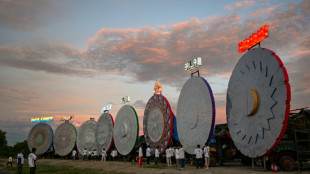 Giant lanterns light up Christmas in Catholic Philippines
Giant lanterns light up Christmas in Catholic Philippines
-
TikTok: key things to know

-
 Putin, emboldened by Ukraine gains, to hold annual presser
Putin, emboldened by Ukraine gains, to hold annual presser
-
Deportation fears spur US migrants to entrust guardianship of their children

| RBGPF | 0% | 80.22 | $ | |
| GSK | 0.55% | 48.556 | $ | |
| RIO | 0.58% | 78.08 | $ | |
| RYCEF | -0.98% | 15.25 | $ | |
| SCS | 0.12% | 16.14 | $ | |
| CMSC | 0.02% | 23.294 | $ | |
| BCC | -2.57% | 75.755 | $ | |
| NGG | -0.09% | 76.32 | $ | |
| CMSD | -0.06% | 23.265 | $ | |
| RELX | 0.12% | 40.7 | $ | |
| AZN | 0.91% | 91.44 | $ | |
| VOD | 0.86% | 12.911 | $ | |
| BTI | -0.39% | 56.82 | $ | |
| BCE | 0.47% | 22.958 | $ | |
| JRI | 0.01% | 13.431 | $ | |
| BP | 1.62% | 33.86 | $ |

Pyramids built along long-lost river, scientists discover
Scientists have discovered a long-buried branch of the Nile river that once flowed alongside more than 30 pyramids in Egypt, potentially solving the mystery of how ancient Egyptians transported the massive stone blocks to build the famous monuments.
The 64-kilometre-long river branch, which ran by the iconic Giza pyramid complex among other wonders, was hidden under desert and farmland for millennia, according to a study revealing the find on Thursday.
The existence of the river would explain why the 31 pyramids were built in a chain along a now inhospitable desert strip in the Nile Valley between 4,700 and 3,700 years ago.
The strip near the ancient Egyptian capital of Memphis includes the Great Pyramid of Giza -- the only surviving structure of the seven wonders of the ancient world -- as well as the Khafre, Cheops and Mykerinos pyramids.
Archaeologists had long thought that ancient Egyptians must have used a nearby waterway to move the giant materials used to build the pyramids.
"But nobody was certain of the location, the shape, the size or proximity of this mega waterway to the actual pyramids site," lead study author Eman Ghoneim of the University of North Carolina Wilmington in the United States told AFP.
The international team of researchers used radar satellite imagery to map the river branch, which they called Ahramat -- "pyramids" in Arabic.
Radar gave them the "unique ability to penetrate the sand surface and produce images of hidden features including buried rivers and ancient structures," Ghoneim said.
Surveys in the field and cores of sediment from the site confirmed the presence of the river, according to the study in the journal Communications Earth & Environment.
The once mighty river was increasingly covered in sand, potentially starting during a major drought around 4,200 years ago, the scientists suggested.
- The great pyramid mystery -
The Giza pyramids stood on a plateau roughly a kilometre from the banks of the river.
Many of the pyramids had a "ceremonial raised walkway" which ran alongside the river before ending at the Valley Temples which served as harbours, Ghoneim said.
This indicates that the river played "a key role in the transportation of the enormous building materials and workmen needed for the pyramid's construction," she added.
Exactly how ancient Egyptians managed to build such huge and long-standing structures has been one of history's great mysteries.
These heavy materials, most of which were from the south, "would have been much easier to float down the river" than transport over land, study co-author Suzanne Onstine of the University of Memphis in the US state of Tennessee told AFP.
The banks of the rivers could have been where the funeral entourages of pharaohs were received before their bodies were moved to their "final burial place within the pyramid," she suggested.
The river may also indicate why the pyramids were built in different spots.
"The water's course and its volume changed over time, so fourth dynasty kings had to make different choices than 12th dynasty kings," she said.
"The discovery reminded me about the intimate connection between geography, climate, environment and human behaviour."
D.Sawyer--AMWN


